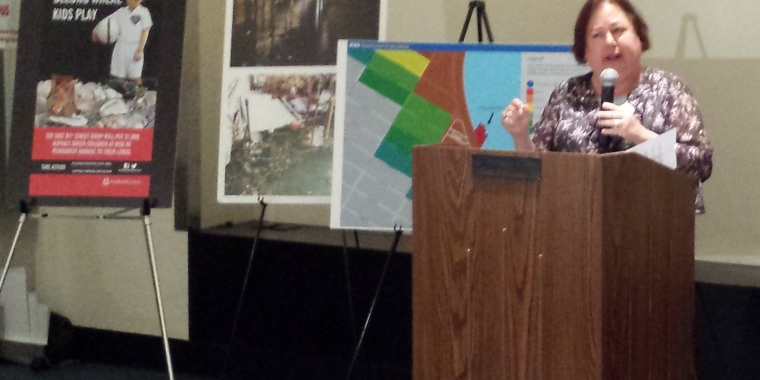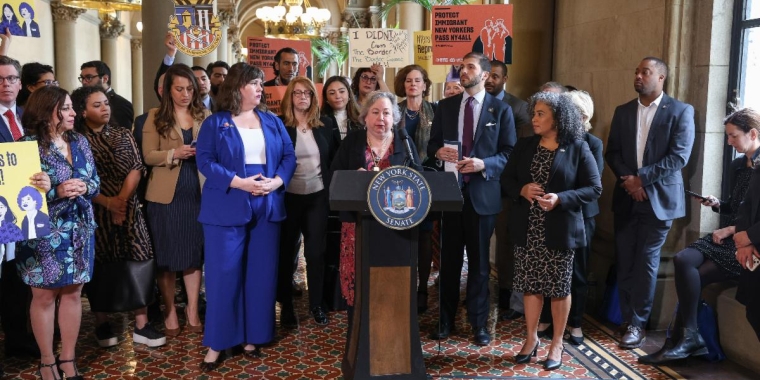
Maloney, Krueger, and Lappin Call on Army Corps of Engineers to Revoke Permit for E. 91st St. Marine Transfer Station Due to Serious Flood Risks
Liz Krueger
August 30, 2013

Congresswoman Carolyn Maloney, State Senator Liz Krueger, and Council Member Jessica Lappin joined community advocates and concerned residents today near the site of the proposed 91st Street Marine Transfer Station (MTS) to highlight the serious flood risks that the MTS would pose to the community and to urge the Army Corps of Engineers to revoke a permit for construction.
"It is no longer a question of if the next big storm will hit, but when. We need to take smart steps now to protect our most flood prone areas. But this proposed MTS location will only make us more vulnerable when the next natural disaster strikes. During Sandy, this spot was badly flooded. It makes no sense to house thousands of tons of garbage in a known flood zone right along the waterfront and just steps away from a senior center, public housing complex and a playground, all of which could be inundated with filthy, hazardous waste," said Congresswoman Maloney.
The city’s plans for the 91st Street Marine Transfer Station call for a 10-story, three-block garbage dump next to the East River, in what is now Flood Zone 1, the most high-risk area for flooding anywhere in the city. During Superstorm Sandy, the FDR Drive adjacent to the proposed MTS was completely under water, to a depth estimated to be eight feet. The floodwaters reached into the fields of Asphalt Green and as far west as Second Avenue.
FEMA says that the flood plain is six feet higher than the proposed base of the building. Instead of building the base higher than the flood plain, a city study calls for floodproofing some of the interior rooms and the outside perimeter with a physical barrier – in an effort to save money at a risk to our community. They're gambling with the health of our community in the event of a major storm.
Just this week, the U.S. Housing and Urban Development Secretary Shaun Donovan visited New York to release the Hurricane Sandy Task Force’s report on a “Rebuilding Strategy.” The report puts forward 69 recommendations, including several suggestions for strengthening infrastructure and increasing the resiliency of areas - like New York City, and the site of the MTS, in particular - that are vulnerable to flooding. The report prominently calls for a focus on “promoting resilient rebuilding through innovative ideas and thorough understanding of current and future risk.” It argues that the new federal standard for construction should include consideration of risk of natural disasters, such as flooding, and, further, that since investments have impacts long into the future, it’s imperative to make wise decisions with infrastructure spending. The current MTS proposal is a stark example of how not to rebuild, which is why it is imperative that the Army Corps of Engineers reconsider its issuance of a permit for the MTS, in light of the risks posed by a changing climate and the chance of increasingly stronger storms.
The elected officials and community advocates in attendance were united in their opposition to the MTS:
“After Superstorm Sandy, it's clear that we live in a new environmental reality. We don't have a full understanding of the potential flooding this site and the surrounding neighborhood can face, and we need to. Worse still, we already know that the current design plan for this marine transfer station puts significant working portions of the facility below FEMA's anticipated flood levels. Adding what we already know to what we still need to find out, it is obvious that this project must not be allowed to move forward without a full reassessment," said State Senator Liz Krueger.
“In light of Hurricane Sandy, the city should reassess the potential impact of flooding at the proposed 91st Street Marine Transfer Station. The site is located in Zone 1, which has the highest potential for flooding, and there should be a thorough evaluation of how this could affect the surrounding community,” said Councilmember Jessica Lappin.
“The prospect of countless tons of toxic garbage -- contaminating everything it touches if a single breach of the system were to occur -- should be reason enough to rethink building a 10-story garbage dump in Flood Zone 1. This dangerous and misguided project is a health hazard and has no place in one of New York City’s densest residential neighborhoods, where thousands of residents of public housing live and tens of thousands of children play at Asphalt Green,” said Kelly Nimmo-Guenther, President of Pledge 2 Protect.
Share this Article or Press Release
Newsroom
Go to Newsroom
Legislature Passes Bill Banning New For-Profit Hospices
April 9, 2025


Senator Krueger's March 2025 Update
March 28, 2025
